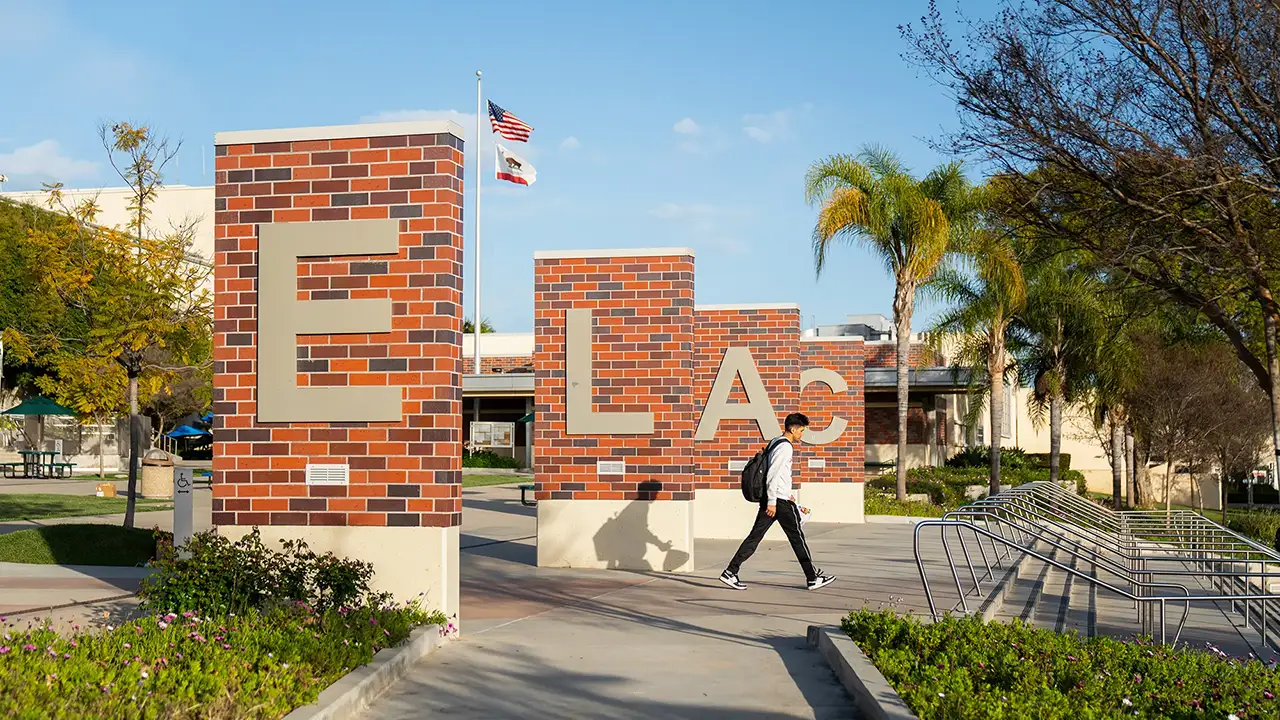California community colleges report a significant rise in fraudulent student applications aimed at stealing financial aid funds. (CalMatters/Jules Hotz)

- Fraudulent community college applications seeking aid jumped from 25% to 34% in the last year, state data shows.
- Scammers increasingly use AI tools like ChatGPT to pose as students, frustrating faculty and taking class spots.
- Millions in federal and state aid have been disbursed to fake students, prompting FBI investigations.
Share
This story was originally published by CalMatters. Sign up for their newsletters.
For years, scammers have targeted community colleges across the state, posing as students in order to steal money from scholarships or government financial aid.
Recent state reports suggest the problem is getting worse, and college leaders say they’re worried that the Trump administration’s cuts to the U.S. Department of Education could hamper fraud prevention and investigations.
Fraud Attempts Increase Significantly
In 2021, the California Community Colleges Chancellor’s Office reported that about 20% of college applicants were likely fake. In January 2024, the state said it was up to about 25%.
Now it’s around 34%, according to the most recent data from the last calendar year. “Those are all the ones that are stopped,” said John Hetts, executive vice chancellor for the data team at the chancellor’s office.
The scammers that aren’t stopped have stolen millions in taxpayer dollars. CalMatters reported that these fake students received more than $5 million from the federal government and nearly $1.5 million from the state, according to anonymized reports that colleges submitted to the state from September 2021 through December 2023.
Faculty say they’re exasperated from working as detectives, trying to suss out which students are real. They say scammers are increasingly relying on artificial intelligence to infiltrate classes, using tools like ChatGPT to pose as students. Students say these fraudsters are taking coveted seats and preventing them from enrolling in classes they need to graduate.
In the last 12 months, colleges reported giving more than $10 million in federal dollars to fake students and over $3 million in state money. Data from the first few months of 2025 show that colleges have already given away more than $3 million in federal aid and over $700,000 in state dollars.
The scope of fraud is “relatively small,” said Chris Ferguson, a finance executive at the chancellor’s office, especially when compared to the roughly $1.7 billion in federal aid and $1.5 billion in state aid given to California’s community college students last year. He also said it’s likely that colleges have improved their ability to detect fraud over time, potentially inflating the reporting numbers.
State lawmakers have allocated roughly $150 million toward cybersecurity since 2022, and the chancellor’s office has brought in numerous tech companies — including ID.Me, N2N, and LexisNexis — to help authenticate students. But Hetts said none of these interventions will ever completely eliminate fraud because each time the state gets better at fighting fraud, the bad actors adapt — the tech equivalent to the “Red Queen hypothesis.”
College leaders also rely on the federal education department to help find scammers. The department is broadly responsible for administering federal financial aid and for preventing and investigating related fraud. The office that administers federal aid has lost about half of its staff through layoffs, voluntary buyouts and retirements. California Attorney General Rob Bonta recently joined other Democratic attorneys general in suing the Trump administration over these cuts, alleging that they violate the U.S. Constitution.
Although not technically part of the lawsuit or the layoffs, the education department’s Office of Inspector General, which is responsible for fraud detection, has also lost staff due to buyouts and early retirements. Since Oct. 1, the Office of Inspector General has lost “more than 20% of its staff,” said Catherine Grant, a spokesperson for the office, including “experienced auditors and investigators.”
“As for how these staffing changes affect the Office of Inspector General’s ability to investigate student aid fraud in California, we are committed to fighting student aid fraud wherever we find it,” Grant said. “But we are limited with what we can do based on our limited resources.”
Fake Students Use AI to Bypass Checks
In 2023, librarian Heather Dodge started to notice something odd about the students who took her online research course at Berkeley City College. To connect with students and make the class more engaging, Dodge said she always began the course by asking students to submit a video introducing themselves using their webcam or an iPhone.
“It’s a very low bar,” she said, but “I started noticing that there would be a handful of students that wouldn’t submit that assignment in the first week.” First, she would send them a message, and then, if they still didn’t respond, she’d drop them from the class.
As long as the teacher drops a student within a certain time frame, in this case the first week, their enrollment in that class is void, and the student can’t seek financial aid for that course. After the first week, however, it’s harder to remove them.
This semester, she said she started with 35 students. Within the first week, she kicked out a few students who didn’t submit a video, but four students found a workaround, sending her a written response instead. The text was generic, she said, “like something ChatGPT would write,” but she wasn’t willing to drop them from the course.
“Are these students who are having technological challenges? Maybe they didn’t have a webcam, maybe they didn’t understand the assignment. It was really hard to suss out what was going on with them.”
Dodge said she’s also worried about how it looks to drop so many students in a class. Community colleges’ funding is largely pegged to enrollment, and the Peralta Community College District, where Dodge teaches, is suffering from enrollment declines and faces major financial losses. “If they see I’m running a class that starts with 35 students and ends with 15, that looks terrible.”
Throughout the class, the four suspicious students continued to submit generic assignments, and eventually, she said she reached out to each one to set up a Zoom meeting. Two never responded. One student did meet with her but said that their camera and microphone weren’t working, so they texted instead. The other student appeared on camera but could hardly speak English, Dodge said. Each time she would ask a question over Zoom, the student would silently wait for their phone to translate. She said the student’s answers “were basically nonsensical.”
Federal Investigations Underway Amid Staff Cuts
By statute, California’s community colleges are required to accept any legitimate student, and state leaders have spent decades trying to make it easier for students to enroll. Community college students must sign an affidavit, swearing the veracity of their information, but otherwise, many colleges don’t independently verify a student’s address or identity.
“We serve a large proportion of students who may not have documentation for a variety of reasons,” said Hetts, with the state chancellor’s office, such as students who are homeless, those who are undocumented, and those who are leaving the foster care system or don’t have a relationship with their parents.

The state chancellor’s office contracted with ID.Me to provide verification through the state’s college application portal, but students aren’t required to use it. However, local districts can impose more stringent requirements.
For a while, Nicole Albo-Lopez, the deputy chancellor for the Los Angeles Community College District said her district was more lenient with college applicants who appeared to be homeless or former foster youth, but “the bots figured that out.”
Last year, she said the district purged roughly a quarter of all class registrations because of potentially fraudulent activity and changed its policy, requiring almost all students to verify their identity. It also paid Socure, an identity verification company, just over $250,000 to help with its fraud detection.
But fraud attempts persisted nonetheless. As wildfires raged through Los Angeles County in January and community colleges raised millions to support students who lost their homes, scammers swooped in. Enrollment at East Los Angeles College suddenly doubled that month, but many of the students were likely fake, said Albo-Lopez. “People probably thought there was going to be fire money.”
At the San Diego Community College District, where instances of fraud are also on the rise, Student Services Dean Victor DeVore said his district has found potentially fraudulent students who passed the ID.Me verification process. Now, he said his district screens all applicants, even those who have verified their identity through ID.Me.
“When you direct less resources to combating fraud…you’re going to get more fraud.”
John Hetts, Executive Vice Chancellor for the data team at the chancellor’s office
Dodge said she asked administrators at the Peralta Community College District for help with all four suspicious students in her class since she no longer had the authority to drop them from the course. The district ultimately removed both students who had agreed to meet with her over Zoom, but she said that the other two students — the ones who never responded — are still in the course. Mark Johnson, a spokesperson for the district, said that those two students are “under review at this time.”
Regardless, Dodge said that both students failed the class.
Colleges are required to submit monthly reports about suspicious applications to both the state and to the U.S. Department of Education, though colleges say the federal government rarely informs them about what it does with that information.
Through a public records request, CalMatters found that in June 2022, the U.S. Department of Education opened an investigation into a fraud ring at Los Angeles Harbor College and West Los Angeles College, where scammers used the identities of “at least 57 individuals” to steal more than $1.1 million in federal aid and loans over the prior four years. In another memo, the Department of Education alerted the FBI about a fraud ring tied to Los Angeles City College that was enrolling people in classes “for the sole purpose of obtaining financial aid refund money,” potentially stealing over $1 million using the identities of 70 different people.
Grant said the education department is still working on the Los Angeles fraud investigations but declined to comment on them, since the department has a policy of keeping information about ongoing investigations confidential.
Since 2020, the education department has also investigated financial aid disbursements at Merced College, Cabrillo College in Santa Cruz County and College of the Siskiyous in Weed. Another four California community colleges have reached out to the department for help regarding fraud or concerns about the misuse of federal aid, according to the department’s records.
Community college leaders say they wish they heard more from the federal government about its fraud investigations, and some say the silence is worrisome, especially now that the education department has lost so many staff.
For Hetts, with the chancellor’s office, it’s a direct correlation: “When you direct less resources to combating fraud…you’re going to get more fraud.”
This article was originally published on CalMatters and was republished under the Creative Commons Attribution-NonCommercial-NoDerivatives license.





















